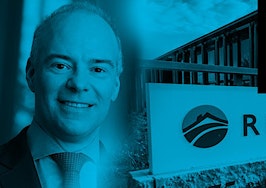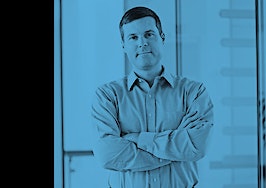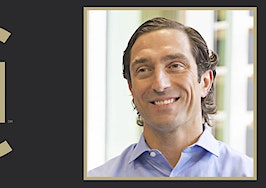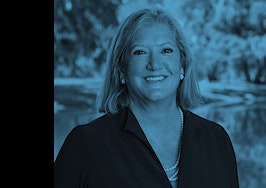As the regional executive vice president of the eastern seaboard and midwest regions at Coldwell Banker NRT, Sue Yannaccone oversees 239 Coldwell Banker offices, owned by parent company Realogy.
Yannaccone has a deep background in the industry that spans the gamut from commercial sales to serving in executive leadership roles at ERA Real Estate and HomeServices of America Affiliates.
She is also one of several female leaders at the executive level at Realogy, which is stunningly rare in the industry despite the majority of Realtors being women.
Yannaccone sat down with Inman for an exclusive one-on-one conversation to discuss Coldwell Banker’s strengths, how to elevate more women to power and what companies like Coldwell Banker can learn from newer brokerage models.

Ayoub Rabah, president of Coldwell Banker Residential Brokerage in Central West, Sue Yannaccone, regional executive vice president of Coldwell Banker NRT and Craig Hogan, vice president of Global Luxury at the Global Luxury Gold Coast office ribbon-cutting ceremony in Chicago. | Credit: Coldwell Banker
Your background in real estate leadership comes from the franchise side. How is that different from running a huge region of the biggest brokerage in the country?
I entered the industry starting as obviously a commercial real estate agent, but then the majority of my time on the franchise side. Coming into the brokerage, I think one of the main differences is sort of the pace of change, I’m finding.
Being able to be very close to the agent and to the customer on this side of the business in a different way, really being able to work closely with the field to help implement and drive change, which is very exciting, and bringing with it my experience of that customer service focus in a little bit of a different perspective from running a franchise to running a brokerage. So it’s been a great transition.
So you mentioned that you kind of got your start in commercial real estate. How does that help you now? What can you take from that background and bring to residential to support your team?
Yeah, what I’ve been able to do is take my understanding of that sales position, you know, from really understanding what it’s like to be on the ground, waking up every day. And while it is dramatically different, the sales cycle of commercial real estate versus residential, the understanding of that passion it takes to get up every day and go out and find that deal. That pace of a deal, as I call it, that transaction, has really helped me.
I’ve never lost sight of that when now coming on to most of my career on the more strategic and business operation side – I’ve never lost sight of that. And so I bring that into everything I do so that I can be a bridge sometimes between, you know, just internal business strategy and executing in the field. It’s a good partnership of knowledge, I would say.
How would you describe your leadership philosophy?
My leadership philosophy is, I like to really focus on understanding what people’s goals are, what their ultimate dream is, and what they’re trying to accomplish. And then ensuring that I’m giving them whatever that may be – their tools, the support, the systems and the guidance to get them there. I think as a leader, the best thing I can do is see somebody on my team just soar beyond their own expectations. And that’s the best part of it for me.
How can you do that and get so hands-on? The region you oversee at NRT would be one of the largest brokerages in the country. How do you manage such a large amount of agents?
With a lot of coffee? No, I spend a lot of time in the field, I think it’s, it’s understanding how you can help take that philosophy and instill it into all of your team and all of your leaders, so that you have an entire organization focused on just that – on helping others live their exceptional life, whatever that may be to them.
So, it’s one-on-one when I can, and I can sit with an agent and we can talk about what they want to accomplish, and how they can leverage our core four values and all of the products and tools that we provide to them. Sometimes it’s having a conversation with somebody about work-life balance, and how they can manage that in their own lives.
Other times, it’s sitting with, you know, maybe 40 managers and talking about how we can shift their focus and their priority and I can help them free up more time for them to do the same thing for their agents. So, it’s more of, it’s a sort of a balance of one-on-one, as well as instilling that philosophy and that view throughout a larger organization.
There are so many different options for agents between all these sorts of disruptive models and more traditional models, how can you show an agent that Coldwell Banker is the best place for them when they’ve got more choices than ever?
There is a lot of choices out there. And I think a lot of it is listening to an agent, listening to an individual issue and understanding what it is that they’re looking for and then ensuring we can articulate to them how we offer that solution for them.
If they’re looking for coaching and support to get them to that next level? Well, we have that, here’s how we do that. How can we help them be more productive? We’re so focused on helping agents grow their business, but it really is understanding that, what does an individual want? What are they looking for?
One size doesn’t fit all. And I think it’s really important that we provide the answer for that agent in a way that makes sense to them. And that’s through conversations and listening and supporting them through our managers and everything that we offer to help them get what they want. Leveraging the size and scale of our organization to develop the best products and tools for them is one way in which we can certainly do that, which others may not be able to.

Sue Yannaccone, third from left, joins David Krieger, president of Coldwell Banker Preferred in Philadelphia, top producing agent Diane Reddington and M. Ryan Gorman, president and CEO of NRT LLC, on stage at the Coldwell Banker Preferred annual agent recognition ceremony. | Credit: Coldwell Banker
Are any of these disruptive models, whether it be you know, a tech-focused brokerage, a flat-fee, brokerage, a discount brokerage, a virtual brokerage, a threat to the real estate industry?
I don’t look at things such as that, as a threat. I look at them — anyone out there, any competition, any new entre, whatever it may be — and try and contemplate what they may be trying to solve and what we can learn from that. I think that when a disruptor — if we want to use that word — or new technology — which is not always disruptive — it can be super beneficial, an additive.
What I look at and say is, what are they trying to solve? Is that a real risk or a real issue and how can I help within my organization, leverage, learn, and then augment what we’re already been providing?
I think one of the biggest threat in my mind is a failure or an unwillingness for the industry at large and individuals to embrace change, and to understand the power that comes and opportunity that comes when change occurs, and understanding the why behind it. And then how to augment themselves in their business. That to me is a bigger threat than any one individual thing out there today.
Well following up on that, what specific things can you take and learn from these different models and bring to Coldwell Banker?
I think what we learned is that — and we’ve learned over time, I mean, over 20 years, decades ago, — technology was going to replace everyone. People have (since) learned this is a relationship-based business. This is still belly to belly across a table in somebody’s living room, trying to guide them through the most oftentimes important, financially large decision they’re ever going to make. It’s often so emotional for people.
And so I think we’ve learned over time the pendulum has swung a little bit. And so for me, it’s saying, How do I balance that? That’s what, over the years, I’ve learned, and that’s what all of us at Coldwell Banker are looking at — how do we look at taking these advances and these changes in, be it, technology, or ways of learning or whatever it may be, and enable our agents to do their job more efficiently and more effectively? That’s what I think the learnings have been for us within the industry
How are you guiding your agents through this turning market?
I think whenever you’re dealing with the market, the focus needs to be enabling agents to thrive in any market. I like to talk to agents about it, I would talk to brokers about it when I was on on the franchise side — building a model that was agile enough to shift in a changing market — whatever that market may be.
There’s always going to be a need for a real estate agent and there’s always going to be a need for somebody to move. And so it’s understanding that, it’s understanding your market, being aware of the numbers, just being really in tune to what’s going on.
It’s cyclical — we’re only it’s a cyclical industry, it always has been and so I think it’s important through education, that we’re ensuring that new agents are aware of that, and that we help them understand what to do in an up market, what to do in a down market, no matter what it is, you need an agile business.
How does being part of a large portfolio of brands help you?
Well, I think we can learn a lot from each other. There’s a tremendous knowledge base out there. And when we’re able to tap into that and to share, it’s tremendous. I mean, nobody can touch that size and that scale that we have, and the ability to learn from each other, and then to make it you know, what we need to do within each brand to operate that way. I think it’s really pretty impressive.
Are there any ways that it hurts your business, being part of such a large company? You run a really big brokerage, but then it’s also part of this kind of grander ecosystem, Does that ever make things more difficult at all?
No, I don’t think so. I firmly believe we learn from each other. I think that is a tremendous value and opportunity. We are open to learning from each other, I learned from franchisees, I’m still connected to franchisees for my other brands, the relationship side of it is tremendous. And I don’t see where it’s a detriment to us.
Do you think it ever impacts your ability to move quickly?
Well, no, I don’t think it impacts that. I would say it has over time, I think, traditionally, size has been viewed as an encumbrance and the mindset shift. What the leadership here is focused on is kind of turning that upside down and saying, you know, imagine the power of the size with momentum. And that is a really, really exciting perspective to have.
And so it can be difficult when you’re trying to reach, you know, hundreds of thousands of people from a Realogy perspective. No matter what the size is, you have to shift the way in which you roll things out in order to reach everyone. But I’m more excited about the momentum with our scale.
Realogy as a whole has had issues with rising agent commission costs in recent years. Is that a problem at Coldwell Banker NRT and in your region? And what are you doing to address that?
I think, you know, there’s been a shift in commissions across the country. I think I will, for the most part, leave the discussions on condition to [Realogy CEO Ryan Schneider].

Hal Maxwell, president of Coldwell Banker Residential Brokerage in New Jersey and Rockland County, New York with Sue Yannaccone (center) joins from left to right, regional vice presidents of Coldwell Banker Residential Brokerage in New Jersey, Rob Norman, Tracey Devine, Lou Redbord and Dan Mancuso to host a luncheon to honor the Sales Associate Advisory Council (SAAC). | Credit: Coldwell Banker
Realogy seems to have a lot of women in regional leadership roles and in leadership roles across the company, which is, is pretty different from the real estate industry’s leadership structure as a whole. What systems does the company have in place to elevate women to leadership roles?
Realogy does have a tremendous number of women in leadership and it’s one of the things that most attracted me to this organization when I was contemplating coming to Realogy. Realogy had a focus on developing talent and that’s across the board. But we have a very robust women’s employee resource group.
We’re focused on ensuring that there is an opportunity for talent wherever that talent may be. I’m involved in the women’s [Employee Resource Group], we’re participating in Women’s Up through the Coldwell Banker brand, supporting that.
I speak a lot about that. I think one of the coolest things about Realogy is they embrace leadership in an authentic way. You’re allowed to be you, whatever that means, and still be successful. There’s no one mold for what defines success here, or one way in which you have to reach that. And that’s just awesome. It makes it such a cool and free environment within which to work.
Is there anything that you do personally, as a leader to help either mentor or elevate women?
Absolutely. You know, in NRT we’re 80 percent women [at the time of the interview, NRT’s executive field leadership team was 80 percent women, but that has since changed] at the executive leadership level, which is really, really awesome. I get calls every single day from across the country, within the building for young women or women wanting to move into a new role or looking.
So I do a lot of informal mentorship as well as some formal things. I try and share my past, I’ve done it very authentically. I try and just guide women especially within the business and the company on how to handle situations or how to approach something, how to balance things when it’s okay not to balance things. I think everybody could learn that lesson actually.
I personally do a lot of informal mentorships. I speak in the industry a fair amount on my perspective of leadership, I’m very open about the reality of being a mom and traveling a couple hundred thousand miles a year and what that takes, and I think I try and do that very honestly. And I think that’s really important is an honest discussion about the reality of women in leadership and what that means.
Why do you think the industry, as a while, still has issues elevating women to leadership positions? Realogy seems to be doing a pretty good job at it at the executive and regional levels.
I think Realogy has provided opportunities that women have chosen to go after. I think that there are lots of exceptionally successful women in our industry that are running, you know, local brokerages that are running amazing teams, that are unbelievably successful. I would argue, potentially, more successful than then a title would suggest.
I think a lot of women choose to stay on that path and may want to have the flexibility that affords. They’re entrepreneurs and running their own businesses and that’s pretty cool. They may not want to walk away from that, they built that in their own right.
I think in the industry, we don’t, we don’t pay enough credence to that, we really don’t, we tend to look in my opinion at the title. I think we undermine sometimes what the vast majority of women are out there doing every day.
They just don’t have this title, and you know what, it takes a lot of sacrifices. And I know a number of women who have said, I don’t want to do that, like, that’s great, but I’m home for dinner every night.
There’s a balance and there’s a choice in that. If there’s not a choice, that’s what we have to address. If there are people out there, organizations that aren’t providing the opportunity that women are then not able to choose, that’s where the problem lies.
What do you think the biggest misconception about Coldwell Bankers is?
People underestimate the power of Coldwell Banker, the innovation that is occurring at Coldwell Banker every day, and the sheer force of our energy.













